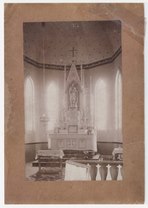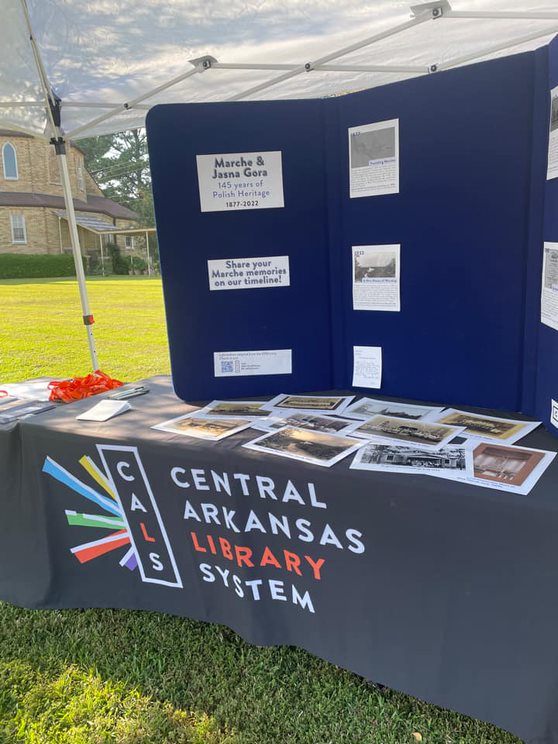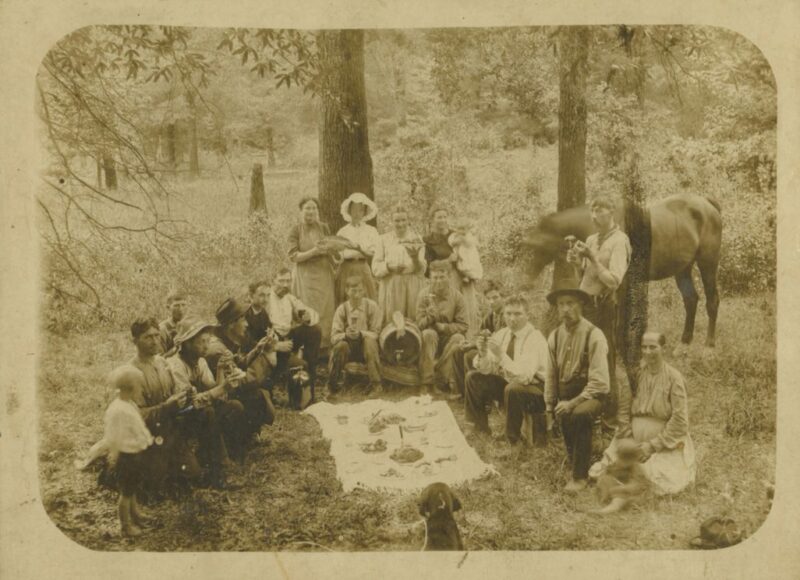Community engagement and post-custodial collecting in Central Arkansas’s Little Poland
23 May 2023 – Danielle Afsordeh
Community engagement has become an essential part of post-custodial collections work. Through community engagement, archives can grow trust with underrepresented groups. The Central Arkansas Library System’s (CALS) Butler Center for Arkansas Studies is currently employing these methods to document the history of the historically Polish Marche community in Pulaski County, Arkansas, while also working to build sustainable community relationships and trust.
In the post-custodial approach to collecting, communities retain custody of their own physical archival objects. The archive does not take custody or ownership of the objects, but instead digitizes them and acts as a steward for access to the materials through digital collections. When communities and archives use this post-custodial approach, these important stories can also find a home in the archival record.
When I was hired as the Community Outreach Archivist in March of 2022, my supervisor encouraged me to create outreach and engagement opportunities and asked me to dig into the history of Northern Pulaski County’s Marche community to see if we could help to document its history.
From what I could immediately tell from the CALS Encyclopedia of Arkansas and our archival holdings, Marche, now part of North Little Rock, had been settled by Polish immigrants in the late-nineteenth century. It is the only known Catholic Polish settlement in the state; the other Poles that settled here were largely Jewish and moved to urban areas. By contrast, the settlers of Marche sought to leave urban areas as anti-Catholic sentiment and violence were on the rise and they hoped to establish a farming community in Marche.

Immaculate Heart of Mary Church original interior, Marche, Arkansas., ca. 1910s, donated by Immaculate Heart of Mary Church, North Little Rock, Arkansas, CALS Butler Center for Arkansas Studies
The original settlers quickly established a church in the area upon what they called Jasna Gora, or Blue Hill, after a famous shrine in Poland. The church still exists, so I contacted the parish priest to find remaining Polish families in the area. Through him, I was able to connect with two community elders who had familial roots dating back to the original community settlement.
These community members informed me that the church held a Polish Karnawal, or carnival, annually to raise money for the parish school that had been continuously operating since the turn of the twentieth century. I worked with the school to set up a tent at Karnawal. Tabling at events is a common public library outreach mechanism, so I was able to use established internal procedures and resources to make an initial connection with the wider remaining Polish community. This was meant to be a springboard to additional community work and provided space to informally connect with members of the community and gather contacts for future work.
At Karnawal, I created a story-sharing activity to encourage folks to share a community memory on paper and place it on a timeline. Over the course of the two-day event, I interacted with over 100 members of the community and met several families with historical photographs and documents dating back to the 1890s.

Photograph of Danielle’s booth at Karanawal at Immaculate Heart of Mary Church and School, North Little Rock, Arkansas., 2022
Today, the Polish community in Marche is small, but those that remain are connected by a shared heritage and, often, familial ties. Through my work in the community, I have learned from community elders about their experiences outlasting many efforts to erase their presence in the area.
Marche never became an independent municipality and much of the original settlement remains an unincorporated area in Pulaski County. The community has never had representation in county or city government because of feeling ostracized by the surrounding Central Arkansas community and the lack of widespread adoption of English until the 1950s.
In 1940, the federal government expanded a local military base nearby. This expansion effectively displaced about 40 families in Marche to the surrounding cities after their land was acquired through eminent domain. The effects are apparent when comparing the 1940 and 1950 federal censuses.
Additionally, mid-century interstate highway development divided the remaining community in half. Eventually, substantial portions of land south of the interstate became part of a new city, Maumelle. This left about one-quarter of the original settlement, including the church. Over time, most of the remaining Polish families relocated to neighboring Maumelle or North Little Rock, leaving just a handful of families behind, according to the remaining community.
After several meetings with community members, I invited those I had fostered relationships with to add their materials to our collection. When visiting with community elders at the parish initially they seemed surprised and distrustful that people outside of Marche would care to preserve their history.
A post-custodial approach to collecting proved most appropriate. Community members remain closely attached to their photographs and documents that tie them to their Polish roots. Employing this model would allow the Butler Center to collect and provide access to digital copies while respecting the donors’ desire to retain ownership of the physical items.
I adopted procedures previously used with other donors to digitize and return original material. We use a specific donation agreement that gives the Butler Center permission to provide access and reuse permissions for digital copies. To ensure that donors from the community had an active role in the appraisal and description of the material, I met with each of them to review the photographs and documents one by one and discuss descriptions and privacy concerns. Though this was time-consuming, it was essential to build a sustainable relationship between community members and the archive and to create thorough, accurate documentation for future processors to describe these materials.

Picnic at Marche Lake, ca. 1906, Marche, Arkansas, featuring many original settlers and the community’s second priest, donated by Joseph Gubanski, CALS Butler Center for Arkansas Studies, 37653015509477
Future goals for this work with the community include creating a digital project that highlights this history outside of our institutional digital collection and working with community members to document and visualize the changes in the geography of Marche over time. By building equitable relationships with community members that center on their hopes for the preservation of their own history, the Butler Center has a unique opportunity to deepen understanding of the Polish roots of the modern Marche community and build community trust in the library system.
~Danielle Afsordeh is the Community Outreach Archivist at the Central Arkansas Library System’s Butler Center for Arkansas Studies. Afsordeh received an M.A. in Public History from the University of Arkansas at Little Rock. She is the former co-coordinator of the DLF Born Digital Access Group and co-author of Levels of Born Digital Access. Afsordeh also teaches public history courses at the undergraduate and graduate levels. Instagram: personal: @danielleafsordeh; work @calibrarysystem



